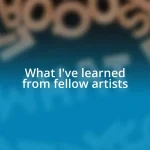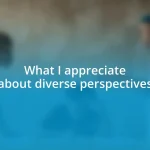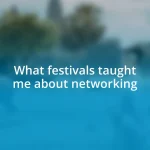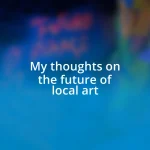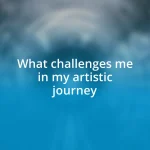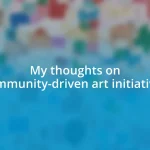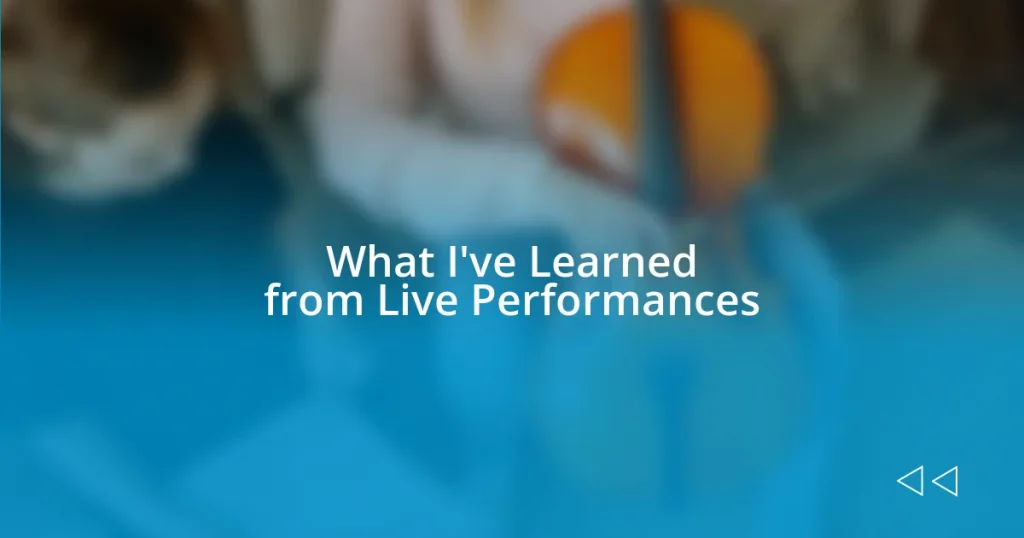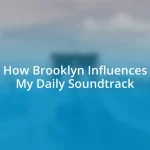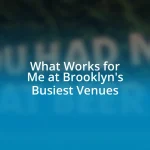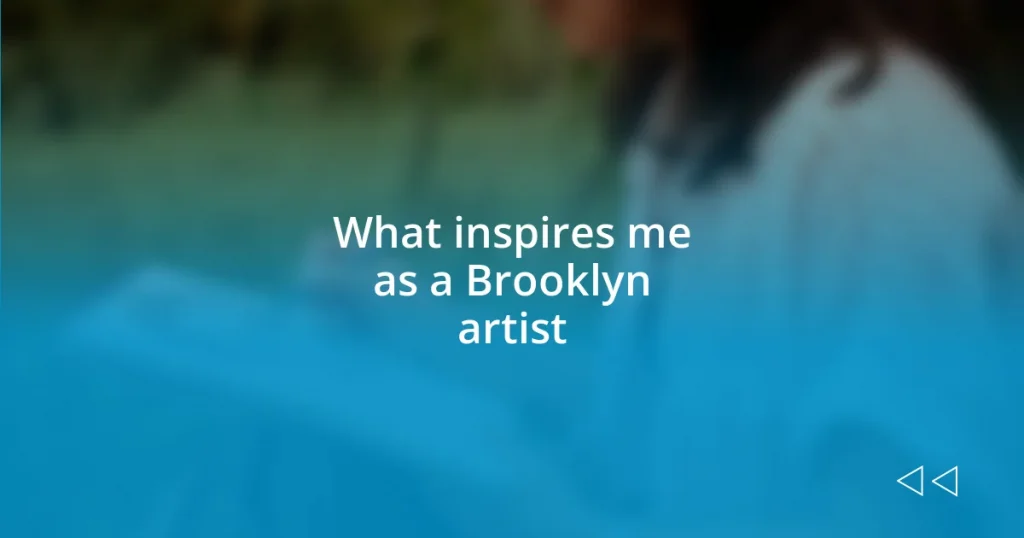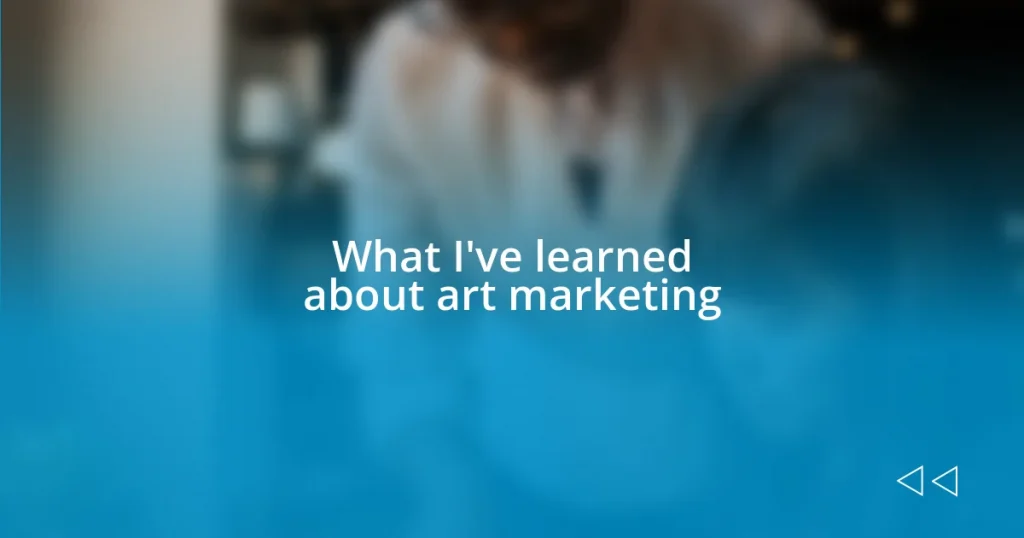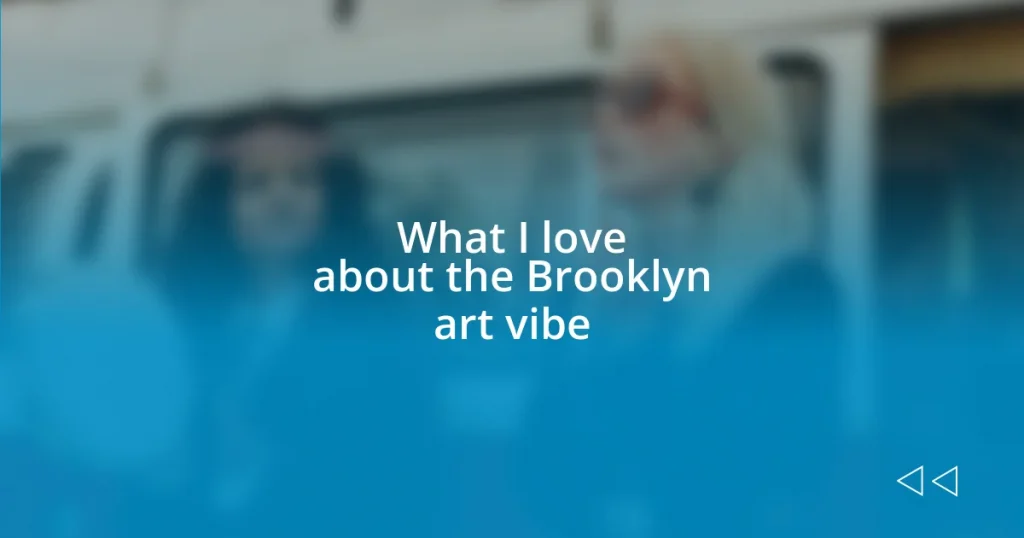Key takeaways:
- Live performances create a unique emotional connection among audiences, enhancing the overall experience through shared moments.
- Combining preparation with spontaneity is crucial, as unexpected incidents can lead to memorable interactions and stories.
- Constructive feedback from performances is vital for growth, transforming criticism into motivation and collaborative improvement.
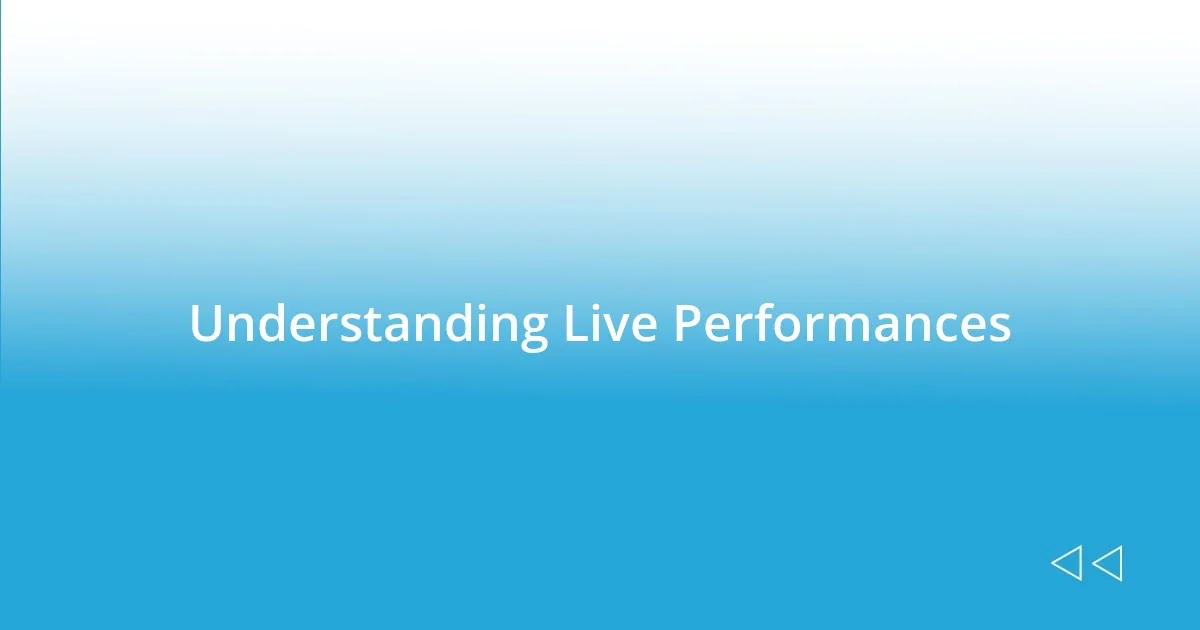
Understanding Live Performances
Live performances are often a unique fusion of energy, emotion, and spontaneity. I still remember the first concert I attended; the raw excitement in the air was palpable. It struck me how the crowd became one living entity, swaying and singing together, creating an atmosphere that recorded music simply can’t replicate. Isn’t it incredible how those shared moments can turn a simple event into a vibrant memory?
Understanding live performances requires us to appreciate the behind-the-scenes elements that contribute to the experience. For instance, the sound engineers, lighting techs, and even the performers themselves bring their own artistry to the stage. I once spoke with a lighting designer who explained how they create moods with color—something that profoundly affects how we feel during a show. Have you ever noticed how a shift in lighting can alter your entire emotional response?
The unpredictability of live performances is another fascinating aspect. I recall watching a band have a technical hiccup, and instead of panicking, they transformed the moment into an impromptu jam. That willingness to adapt not only showcased their talent but deepened my appreciation for their craft. How often do we encounter such genuine moments in our day-to-day lives? It’s these instances that remind us of the beauty of being present in the moment.
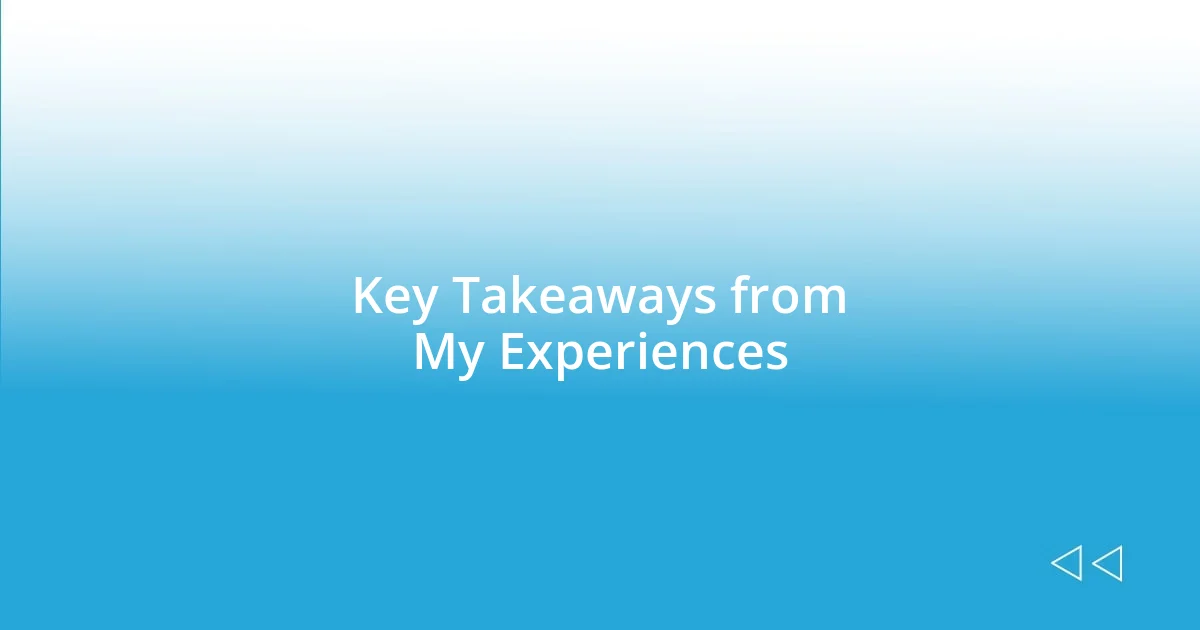
Key Takeaways from My Experiences
Experiencing live performances has taught me the power of connection. I remember standing in the front row of an outdoor festival, feeling the bass reverberate through my chest as the band played my favorite song. That moment was electric; it was as if the music was a living force binding the audience together. It’s remarkable how we can share such intense feelings with total strangers, united by a single moment.
One key takeaway that stands out to me is the importance of preparation paired with spontaneity. I once attended a small venue gig where the lead singer forgot the lyrics to a song. Instead of floundering, they laughed it off, invited the audience to sing along, and turned the mishap into a memorable interaction. This taught me that it’s crucial to be ready for anything while also embracing the unexpected. Have you ever noticed how these unplanned instances often lead to the best stories?
Lastly, I’ve learned that passion can transcend technical perfection. At a local performance, I watched a novice guitarist who stumbled through a solo but played with such heart that it didn’t matter. The audience cheered louder than for some seasoned professionals. This experience solidified my belief that authenticity resonates deeply; it’s not just about skill but about pouring your soul into what you do. Isn’t it fascinating how being genuine can leave a lasting impact on others?
| Key Aspects | Significance |
|---|---|
| Connection | Brings audiences together in a unique, shared emotional experience |
| Preparation & Spontaneity | Highlights the importance of readiness while embracing unexpected moments |
| Passion over Perfection | Shows that authenticity and heart can create a more profound impact than technical skill alone |
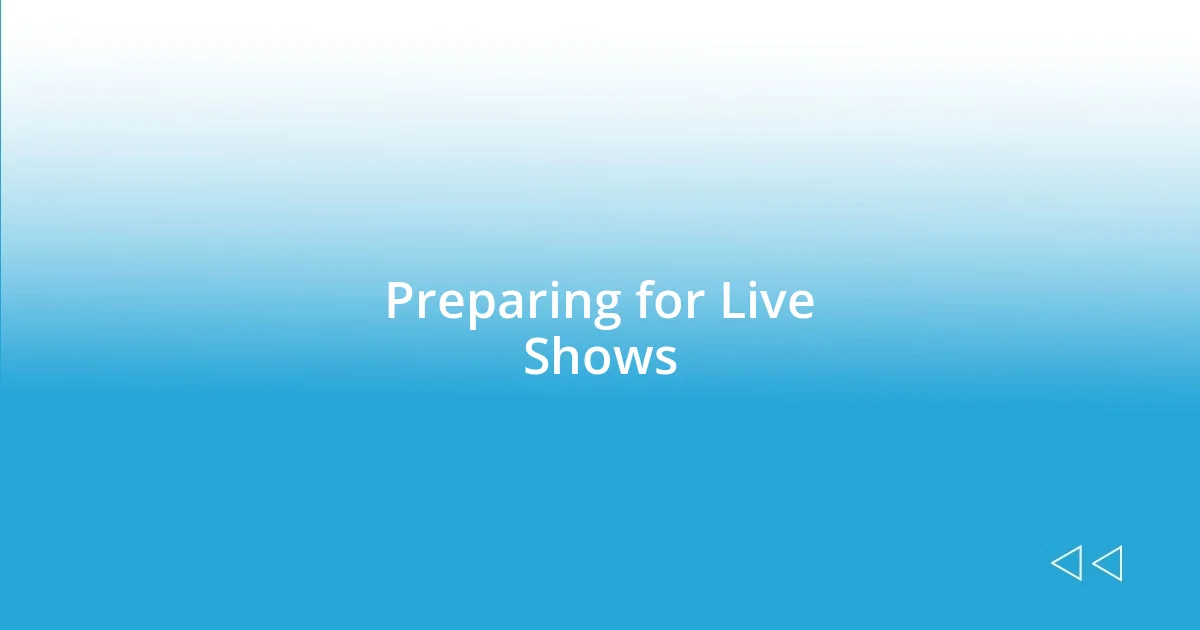
Preparing for Live Shows
Preparing for a live show isn’t just about tuning instruments or running through a setlist—it’s a mental and emotional journey as well. I’ve often seen artists pacing backstage, deep in their thoughts before the curtain rises. It’s a time filled with anticipation, nerves, and excitement. There’s something transformative about that moment right before going on stage; you can almost feel the electricity in the air. It’s a blend of preparation and vulnerability that gets me every time.
Here are some key elements I believe contribute significantly to effective preparation for live performances:
-
Rehearsal Consistency: Regular practice builds confidence and ensures the band is tight. It’s like running a well-oiled machine.
-
Mental Visualization: I find that visualizing the performance helps calm nerves. Imagining the audience’s reactions can also enhance the excitement.
-
Technical Checks: Sound levels, lighting, and equipment functionality must be spot on. I remember a show where a guitar was out of tune until the last minute, leading to a frantic correction right before the first note.
-
Setting the Atmosphere: Personal touches, like unique set designs or even the warm-up playlist, can set the tone for the audience’s experience.
-
Emotional Preparation: Getting in touch with emotions to convey during the performance can make all the difference. I once saw a singer take a moment of silence before starting a heartfelt ballad, and it drew the audience in like a magnet.
Successfully weaving these elements together reinforces the connection between performers and their audience, creating a truly unforgettable show.
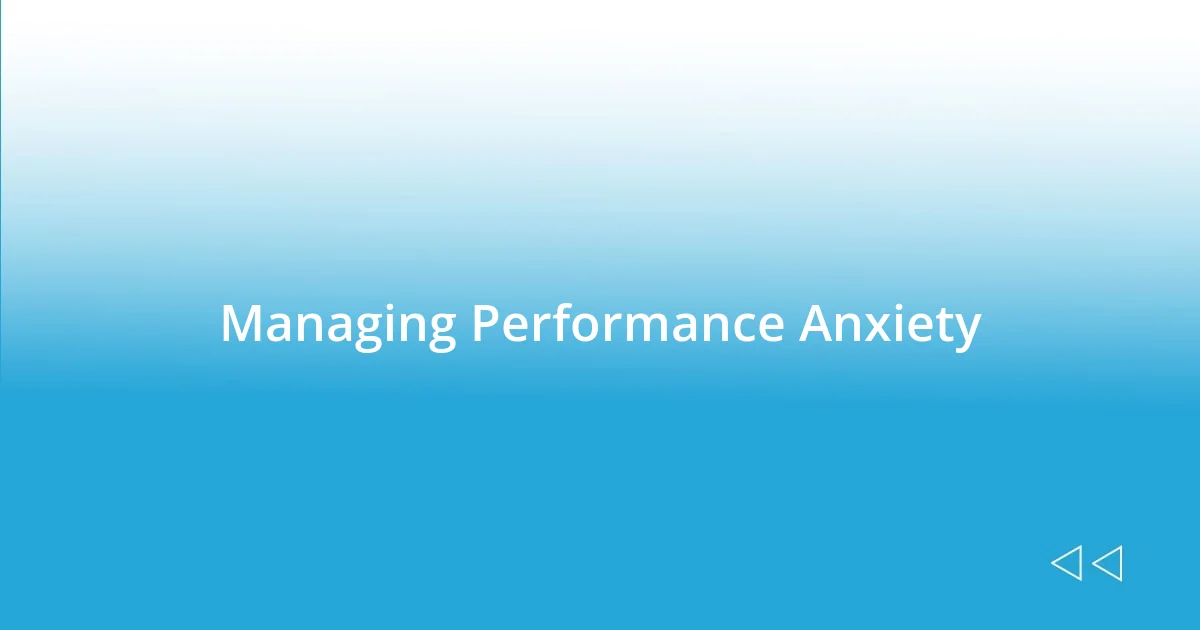
Managing Performance Anxiety
Managing performance anxiety is something I’ve grappled with firsthand, so I can completely relate to how overwhelming it can be. Before stepping onto the stage for my first major gig, my palms were slick with sweat, and my heart raced as if it were in a marathon. In that crucial moment, I took a deep breath and reminded myself that everyone watching was cheering for me. That simple acknowledgment shifted my mindset. Have you ever noticed how powerfully our thoughts can impact our feelings?
I’ve found that embracing pre-performance rituals can significantly ease anxiety. For instance, I once developed a routine of doing vocal warm-ups while standing in front of a mirror, giving myself a mini pep talk. The reflection staring back felt like a friend offering support. This small act transformed my trepidation into a sense of readiness. Isn’t it interesting how familiar actions can ground us and provide a sense of control?
Additionally, sharing my worries with fellow performers has proven invaluable. There’s something comforting about knowing I’m not alone in these feelings. I remember a conversation with a bandmate who confided about their own battle with anxiety. Instead of isolating ourselves, we laughed it off, which built a stronger bond and lightened the mood. Have you ever felt relief in knowing that others face the same challenges? It’s a reminder that vulnerability can connect us on a deeper level.
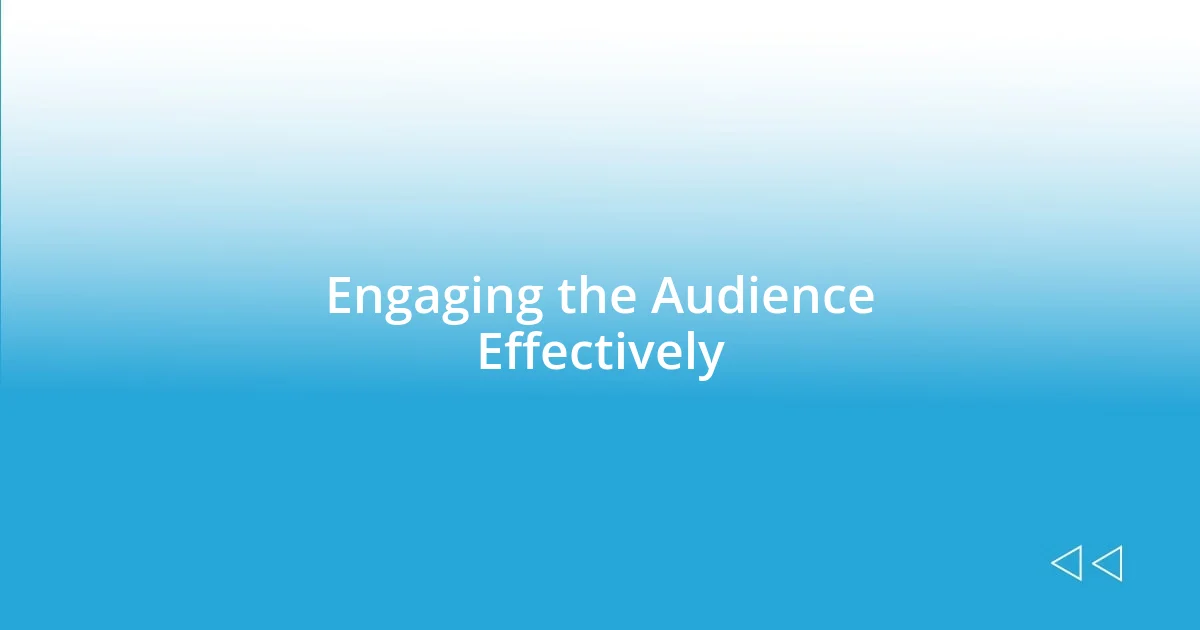
Engaging the Audience Effectively
Engaging an audience effectively is an art form that I’ve honed through experience. I remember one gig where I locked eyes with a front-row fan, and suddenly, it was just the two of us in the room. That connection fueled my performance; it was like pouring energy into the crowd. Have you ever felt the magic of a shared moment like that? It’s one of those things where a single glance can transform a performance, turning it into an intimate exchange.
Incorporating interactive elements has also been a game-changer for me. During one show, I asked the audience to sing along to a familiar chorus. The moment their voices blended with mine was exhilarating and created an electrifying atmosphere. I mean, who wouldn’t want that communal experience? Engaging the audience this way makes them feel like they’re part of the journey, not just spectators sitting in their seats.
Establishing a comfortable environment is crucial for engagement. I recall a small venue where the setup felt like playing in someone’s living room. The coziness allowed me to chat with the audience between songs, which turned awkward pauses into memorable moments of connection. When performers drop the wall between stage and audience, it invites a sense of belonging. Don’t you think that warmth can make all the difference in how people remember a show? It’s proof that engagement goes beyond just the music; it’s about creating an immersive experience together.
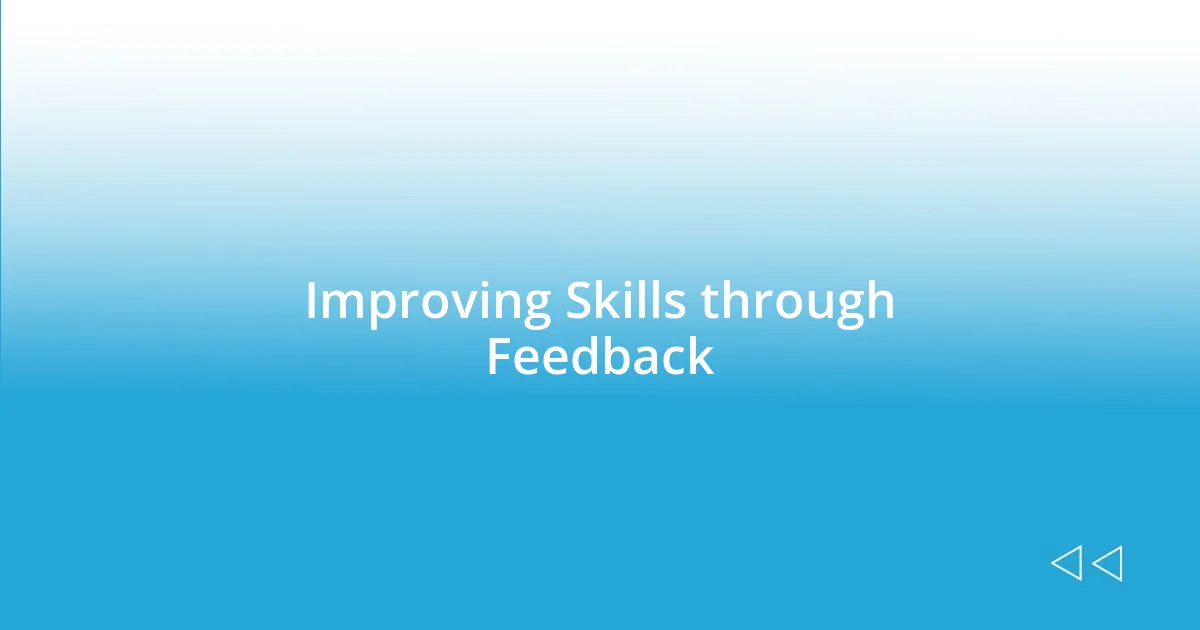
Improving Skills through Feedback
Feedback is a powerful tool I’ve learned to embrace, particularly coming from live performances. After one particularly rough set, I received comments from both my bandmates and audience members that completely shifted my perspective. One fan approached me, sharing how they detected the hesitation in my playing. It stung a little at first, but that honesty sparked a determination in me to improve. Have you ever felt that initial sting of criticism transform into motivation?
I also remember an instance where my guitar teacher attended one of my gigs. Post-performance, he pointed out a few missteps but balanced it with praise for my stage presence. It was eye-opening to realize that constructive criticism isn’t just about pointing out flaws; it’s also about recognizing growth. Have you found that a mix of feedback boosts your confidence? That blend encouraged me to push my boundaries while giving me insights into how my performance resonated with others.
Incorporating feedback into my practice sessions has become a rewarding journey. I recall a rehearsal where I wanted to nail a tricky solo. After attempting it multiple times and getting mixed reviews from my bandmates, I finally took a step back. Listening attentively to their suggestions helped me refine that solo into something I truly owned. Isn’t it amazing how feedback can turn a moment of vulnerability into a breakthrough? It taught me that the pursuit of excellence is often a collaborative adventure, rather than a solo mission.
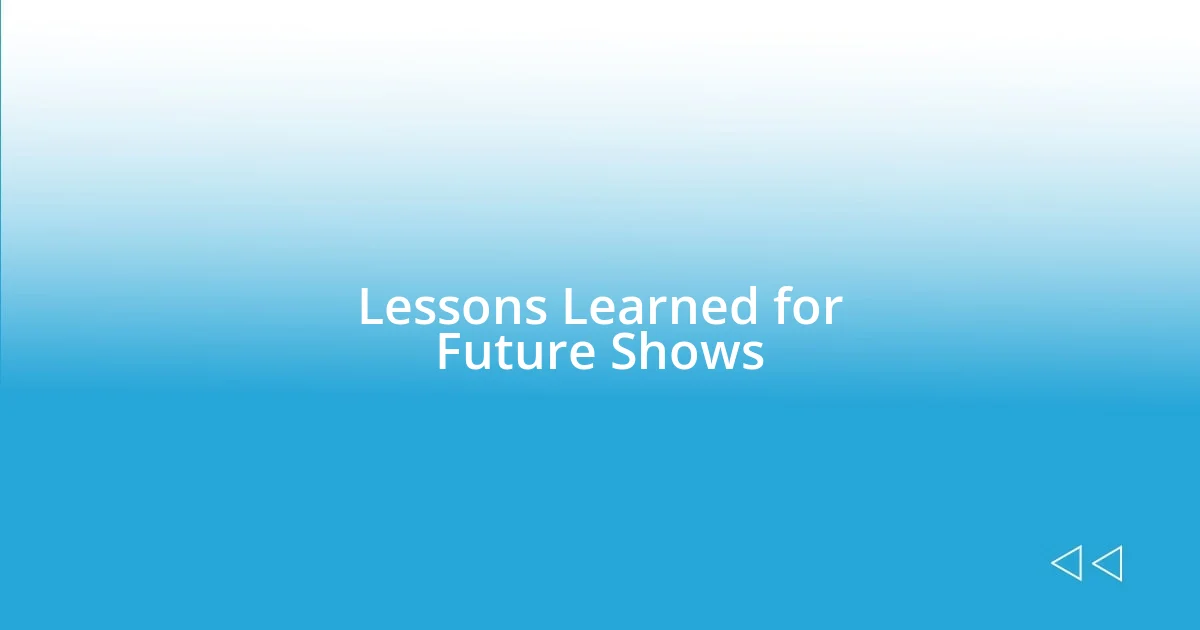
Lessons Learned for Future Shows
Finding a consistent rhythm in my performances is something I’ve learned through trial and error. I recall a time when I went on stage without a clear plan for transitions between songs. It felt like a jigsaw puzzle with missing pieces as I fumbled through awkward silence. Have you ever felt the weight of a moment stretch longer than it should? That experience taught me the importance of keeping the energy flowing, ensuring that each moment on stage feels seamless and connected.
Another lesson I’ve taken to heart is the significance of rehearsing with the full band. There was a show where we stepped onstage with only a loose understanding of our setlist. As the tunes rolled out, I could almost hear the tension simmering. It was a stark reminder that coordination is key. Have you ever faced that unsettling feeling when something just isn’t clicking? Since then, I’ve committed to refining our preparation process, knowing that practice builds not only skill but confidence as well.
Last but not least, I now recognize the value of self-reflection after each show. After one gig, I took quiet moments to jot down what felt exhilarating and what fell flat. That reflection became my personal map to improvement. How often do you take time to consider your experiences? This practice nurtured a deeper understanding of my craft, helping me pave a thoughtful path for future performances, ensuring my growth never stagnates.




